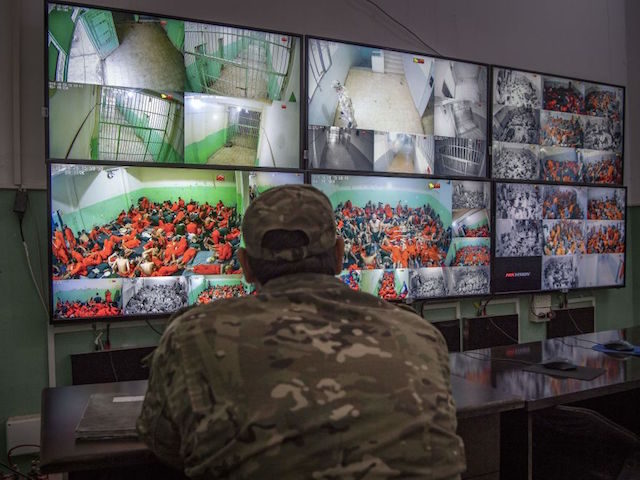Marine General Kenneth McKenzie, head of the U.S. Central Command (CENTCOM), said during an online forum Wednesday that he is concerned about a resurgence of the Islamic State in Syria’s prison camps.
McKenzie recommended repatriating foreign ISIS prisoners as quickly as possible and working to de-radicalize them once they have returned to their countries of origin.
“We’re buying ourselves a strategic problem 10 years down the road, 15 years down the road, and we’re going to do this all over again. I would prefer to avoid that,” McKenzie told a forum organized by the U.S. Institute of Peace.
McKenzie warned the infamously overcrowded and unsanitary al-Hol camp — which is run by the Kurdish-led, U.S.-backed Syrian Democratic Forces (SDF) — would become a breeding ground for radicalism and terrorists. Many of the detainees are from countries that are not eager to take their treacherous citizens back or finance the necessary de-radicalization programs. McKenzie said the size and conditions of the al-Hol camp make it prohibitively difficult to conduct deradicalization there.
“If we stay where we are, we’re going to have huge problems: huge problems in the near term with lots of people potentially dying, and then huge problems in the long-term because I have yet to see a scheme that can talk about de-radicalization at scale,” he said.
“I don’t have an answer besides repatriation,” he cautioned. “We either deal with this problem now, or deal with it exponentially worse a few years down the road.”
Stars and Stripes noted that most of the prisoners held at al-Hol are Iraqis and Syrians, but there are also thousands of foreign women who married ISIS fighters and came to live with them in the “caliphate” carved out of Syrian and Iraqi territory. Some 28,000 non-Syrian children are also living in the huge prison camp, potentially providing the manpower for the Islamic State comeback McKenzie fears in the next decade.
McKenzie said the U.S. military is willing to transport the women and children back to their home countries “very quickly, in a safe and transparent manner,” but few of their native countries have expressed a willingness to take them. According to Deutsche Welle in April, only Russia, Malaysia, Uzbekistan, and Kosovo have agreed to repatriate their citizens from the camps.
The Syrian prison camps are a source of constant anxiety for military planners and diplomats, presenting challenges from the risk of ISIS fighters staging a mass breakout, the SDF running low on the resources needed to keep the camps secure, and growing humanitarian concerns about the living conditions of the prisoners, especially the children.
In McKenzie’s analysis, ISIS has not been completely and decisively defeated, and it might never be. “There’s not going to be a significant victory celebration. There’s not going to be a clear-cut military victory,” he cautioned.
The CENTCOM chief said the terror state was dealt a powerful blow by losing the land it controlled, the revenue it generated from that captive territory, and the standing army of jihadi fighters it once commanded, but it still has a global influence network and its ideology remains a pernicious threat. He envisioned breaking ISIS down until it becomes a small enough threat to be effectively contained by local forces.
“I don’t think we’re going to be in Syria forever,” he anticipated. “I don’t know how long we’re going to be in Syria. That’s going to be a political decision. Not a military decision to be made by a uniformed officer.”

COMMENTS
Please let us know if you're having issues with commenting.